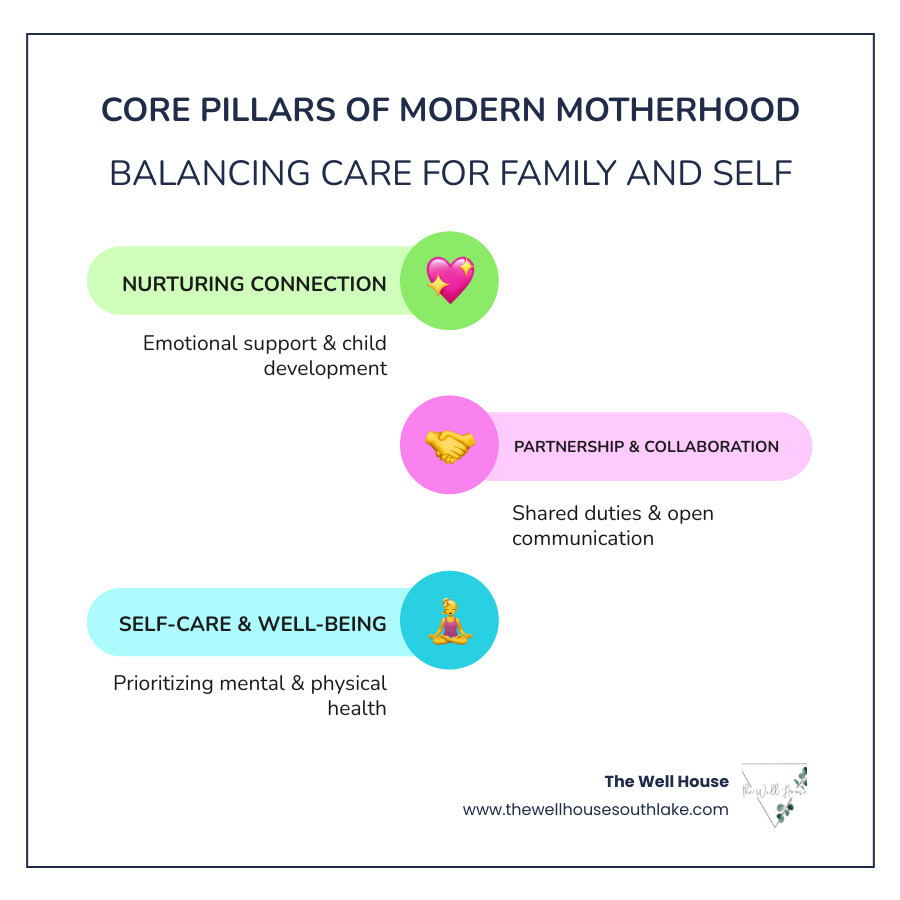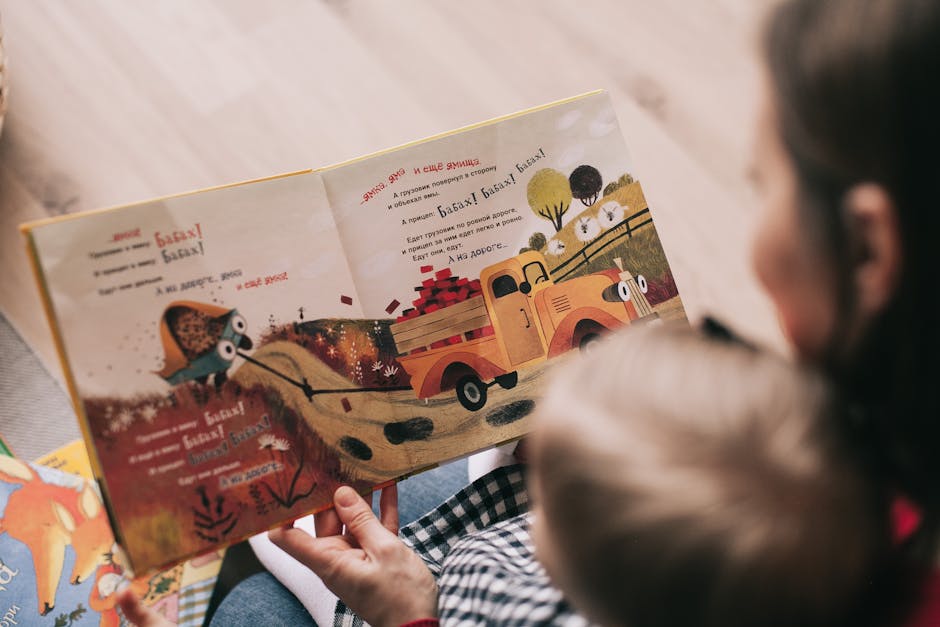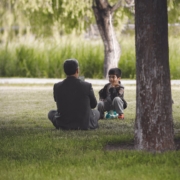The Sacred Journey: Understanding Motherhood’s Responsibilities and Finding Your Support System
Why Understanding Motherhood Responsibilities Matters More Than Ever
Motherhood responsibilities have evolved dramatically, creating both opportunities and overwhelming pressure for today’s mothers. Modern mothers face a complex web of expectations, extending beyond traditional caregiving to emotional labor, household management, career balance, and personal growth.
Core motherhood responsibilities include:
- Nurturing and emotional support – Being present, available, and creating secure attachments
- Child development facilitation – Supporting physical, emotional, and educational growth
- Household coordination – Managing schedules, activities, and family logistics
- Partnership collaboration – Sharing domestic duties and parenting decisions
- Self-care maintenance – Prioritizing mental health and personal well-being
- Teaching and guidance – Modeling values, behavior, and life skills
Research shows mothers today do more on their own than any previous generation, often while managing careers and facing societal pressure to be “perfect.” This leads to the “mental load”—the invisible cognitive and emotional labor of managing family life that disproportionately falls on mothers.
Yet motherhood isn’t just about tasks. It’s about fostering relationships, creating emotional safety, and nurturing growth in your children and yourself. According to research, the most fulfilling aspect of motherhood is witnessing your children thrive, knowing the unique love and dedication you provide.
I’m Jennifer Kruse, a Licensed Professional Counselor Supervisor specializing in supporting women through the complexities of motherhood responsibilities. Through my work and my own experience raising three children, I’ve learned that understanding your unique motherhood journey is the first step toward a sustainable, joyful family life.

Quick motherhood responsibilities definitions:
The Heart of Mothering: Nurturing Connection and Fostering Growth
The most important role of a mother isn’t having a perfect house or a checked-off to-do list. It’s about the profound work of nurturing connection and creating a foundation for your child’s growth.
Motherhood responsibilities at their core revolve around providing emotional security and fostering healthy development. Reading bedtime stories, listening to worries, or celebrating small victories is the essential work of mothering. Through these daily interactions, you teach values, show unconditional love, and create a safe space for them to grow.
This nurturing has a long-term impact. The emotional intelligence, resilience, and moral compass you help build become the foundation for their future. This work of nurturing goes beyond the practical—it’s about shaping hearts and souls.
This deep connection benefits mothers, too. Watching your child master a new skill or feeling their hug after a hard day fills you with purpose and joy, reminding you why this emotional work is so rewarding.

Defining Your Individual Motherhood Responsibilities
Fostering relationships with your children is more important than a spotless kitchen. It’s vital to separate your core motherhood responsibilities from societal expectations.
Your primary job is being emotionally available—knowing your child’s personality and creating space for connection. You are their safe space, where they can share fears and worries without judgment.
Modeling healthy behavior and supporting your child’s personal growth are uniquely yours. However, household chores, meal prep, and organizational tasks are family responsibilities that should be shared.
When we reframe our thinking this way, we free ourselves to focus on what matters most: building strong, loving relationships with our children while teaching them how to steer the world with confidence and kindness.
A Mother’s Unique Contribution to a Child’s Life
Mothers uniquely contribute to a child’s development. They often act as emotional teachers, helping children develop emotional intelligence by naming feelings and navigating life’s ups and downs.
Attachment theory shows that secure bonds formed in early years become a template for future relationships. Consistently responding to their needs, offering comfort, and celebrating victories helps build their trust in themselves and others.
We also serve as their moral compass through daily interactions. Showing kindness, admitting mistakes, or standing up for what’s right teaches values more powerfully than any lecture.
Building resilience happens when we guide children through problem-solving instead of fixing everything for them. We help them find their own strength while knowing we’re always their safety net.
Perhaps most importantly, we’re often the keepers of family traditions, creating the rituals that make childhood magical. This isn’t about perfection; it’s about unconditional love that says, “You belong here, exactly as you are.”
These contributions shape not just childhood, but the adults our children will become. And that’s a responsibility worth embracing with both confidence and grace.
The Weight of Expectation: How Society Shapes a Mother’s Role
Being a mother today can feel overwhelming. The nurturing core of motherhood responsibilities is often buried under impossible societal expectations.
The myth of the “good mother” has evolved into the exhausting concept of “intensive mothering”—being completely child-centered, emotionally available 24/7, and focused on optimizing child development.
Social media adds to the pressure, with curated family moments that fuel self-doubt. Cultural norms whisper that mothers should constantly do more, all with a serene smile.

The result? Maternal guilt that follows us like a shadow. We feel guilty for working, guilty for not working, guilty for needing a break, and guilty for feeling guilty. It’s a vicious cycle that leaves many mothers feeling like they’re constantly falling short.
Here’s what society typically expects from mothers today:
- The Present Mother: Always tuned in to every need and emotion
- The Future-Oriented Mother: Responsible for securing perfect outcomes through endless activities and optimization
- The Working Mother: Seamlessly balancing career success without missing a beat at home
- The Public Mother: Always composed and in control, no matter what’s happening behind closed doors
- The Happy Mother: Perpetually fulfilled and grateful, even when struggling
- The Self-Sacrificial Mother: Putting everyone else’s needs first, always
- The Flawless Homemaker: Managing every household detail to perfection
- The Emotional Manager: Keeping everyone happy and resolving all conflicts
The Impact of “Intensive Mothering” on Well-being
Trying to meet these impossible standards often sacrifices our well-being. This pressure creates the “mental load”—the invisible thinking, planning, and worrying behind family life.
This mental load includes remembering a child needs new shoes during a work meeting, worrying about parenting choices at 2 AM, and tracking everyone’s schedules and emotional needs.
The consequences are serious, including burnout that goes beyond normal tiredness, constant anxiety, and a feeling of losing one’s identity in the role of “mom.”
Financial strain often follows when mothers feel pressured to reduce work hours or leave careers entirely to meet these unrealistic expectations. The constant surveillance – both from others and ourselves – creates a pressure cooker environment where we’re always comparing ourselves to other mothers and finding ourselves lacking.
Reshaping Expectations: From Perfection to Presence
The truth is, good enough is actually great. Your children don’t need a perfect mother; they need a present, authentic one who also takes care of herself.
Challenge these norms by defining your own family values. Decide what truly matters: a spotless house or time to read together? Perfectly planned activities or spontaneous fun?
Setting boundaries is essential. This might mean saying no to an extra volunteer opportunity or letting your partner handle bedtime so you can have thirty minutes to yourself. It means recognizing that you can’t pour from an empty cup.
Shifting from performance to connection is key. Focus on listening to your child instead of planning perfect activities. Enjoy the messy, real moments instead of stressing over perfect photos.
Your children are watching how you treat yourself. When you model self-compassion and healthy boundaries, you’re teaching them valuable lessons about self-worth and balance that will serve them throughout their lives.
At The Well House, we understand how overwhelming these expectations can feel. Sometimes talking through these pressures with a professional can help you sort out what truly matters and develop strategies for managing the rest.
Navigating Shared Motherhood Responsibilities in a Partnership
In modern families, motherhood responsibilities should be shared parental responsibilities. Yet, many mothers still carry the bulk of the load, even in dual-income households.
Statistics show a significant gap: women spend more time on housework and childcare, and while most fathers in dual-career couples believe labor is split equally, less than half of mothers agree. This highlights the invisible burden mothers carry.
Effective partnerships can change this dynamic through open communication and teamwork. This involves discussing all tasks, from visible chores like laundry to invisible ones like planning appointments.
Same-sex couples often model a more equal distribution of labor, proving that consciously dividing responsibilities outside of traditional gender roles leads to greater fairness.
Resources like The Fair Play Method offer structured approaches to making these “hidden” tasks visible and assigning clear ownership. Because someone needs to remember that the kids need new shoes, and it shouldn’t automatically be mom.

Distinguishing Between Maternal and Parental Duties
While mothers and fathers might have different natural strengths—mothers often excel at verbal expression and fostering social skills, while fathers might engage in more physical play—this doesn’t mean certain duties belong exclusively to one parent.
The shift from traditional roles to modern shared parenting looks dramatic when you see it laid out:
| Aspect | Traditional Maternal Role | Modern Shared Parental Role |
|---|---|---|
| Nurturing | Primarily mother’s domain (emotional support, comfort) | Shared by both parents (both provide emotional security) |
| Childcare | Mother as primary caregiver (feeding, bathing, daily needs) | Shared by both parents (feeding, bathing, daily needs) |
| Education | Mother as first teacher (early learning, homework help) | Shared by both parents (both actively involved in learning) |
| Household Chores | Mother as main housekeeper (laundry, cleaning, cooking) | Shared by both parents (tasks divided fairly, children included) |
| Mental Load | Mother responsible for all planning and remembering | Shared by both parents (conscious effort to distribute mental labor) |
| Financial Management | Often father as sole provider, mother manages household budget | Shared by both parents (joint financial planning and decision-making) |
| Discipline | Often mother as primary disciplinarian | Shared by both parents (consistent, collaborative approach) |
| Emotional Support | Mother as primary confidante | Shared by both parents (both offer comfort and guidance) |
The goal isn’t to eliminate different parenting styles but to create an equal partnership where both parents contribute to all aspects of child-rearing and household management.
Creating a Balanced and Supportive Family Environment
A balanced family environment requires consistent effort and clear systems. Hold regular check-ins during calm moments to honestly discuss what is and isn’t working.
Making the invisible visible is crucial. Use shared calendars or apps to track not just tasks, but also the planning and remembering involved. This transparency helps in sharing the load fairly.
Prioritizing your relationship as partners creates the strong foundation your whole family needs. A healthy partnership provides stability that children can feel and benefit from. When parents work as a team, everyone wins.
Sometimes, despite best efforts, couples find themselves stuck in old patterns or struggling to communicate effectively. If conversations about sharing responsibilities become heated or unproductive, professional guidance can make all the difference. More info about couples counseling can provide the safe space and tools you need to build the partnership you both want.
Creating balance isn’t about perfection—it’s about progress, communication, and mutual respect. When both parents feel supported and valued, the whole family thrives.
Beyond the To-Do List: Why Self-Care is a Core Responsibility
Self-care isn’t selfish—it’s one of your most important motherhood responsibilities. You can’t pour from an empty cup. Like the airplane oxygen mask rule, you must care for yourself first to be able to care for others.

Self-care is essential for preventing burnout and maintaining well-being. Taking time to recharge, even for a few moments, is an investment in your ability to be present for your family.
Your children are watching everything you do, including how you treat yourself. When you model self-respect and healthy boundaries, you’re teaching them that their own well-being matters too. That’s a gift that will serve them their entire lives.
Emotional regulation is another key benefit. A rested, centered mother can respond to daily challenges with more patience and clarity, while a depleted one may find everything feels like a crisis.
Strategies to Manage Responsibilities and Avoid Burnout
Managing motherhood responsibilities without burning out requires intentional strategies. The good news is, they don’t have to be complicated.
Time management means creating simple routines and asking for help when you need it—even from your kids, who can handle age-appropriate chores.
Building a support system is crucial. Your “village” might be a neighbor who helps with carpool or a friend who listens. Don’t be afraid to accept help when it’s offered—and don’t hesitate to ask for it.
Setting realistic goals means focusing on what truly matters, like your child feeling loved, rather than a Pinterest-perfect party. Good enough is great.
Mindfulness and scheduling downtime can be as simple as taking three deep breaths or as elaborate as a weekly yoga class. Find what works for you. Even five minutes of quiet time can make a difference.
Setting healthy boundaries is a vital skill. This includes not over-functioning for your children and saying no to draining commitments.
The Consequences of an Overburdened Mother
When mothers consistently carry too much without support, the effects ripple through the entire family. Maternal depression and anxiety are real risks of being constantly overwhelmed.
The physical toll is also significant, as chronic stress can cause headaches, sleep problems, and a weakened immune system.
Resentment in partnerships often builds when one person carries an unfair share of the load, creating tension that affects the whole family’s emotional climate. Children feel this stress too.
This pressure can lead to a loss of identity, where you feel you’ve disappeared into the role as “mom.” This is counterproductive, as children benefit from having fulfilled mothers.
Strained family dynamics often result when an overwhelmed mother is too depleted to be emotionally available for the connections that matter most.
Recognizing these warning signs isn’t about adding guilt; it’s about understanding why taking care of yourself is actually taking care of your family. When you prioritize your well-being, everyone benefits.
Frequently Asked Questions about Motherhood’s Demands
What are the most important responsibilities of a new mother?
The transition to motherhood is overwhelming. Here’s what truly matters in those first few weeks.
Focus on bonding with your baby. Quiet moments, feeding, and learning to comfort your child are the motherhood responsibilities that matter most, building the foundation of your relationship.
Physical recovery is essential. Your body needs time to heal, so don’t push yourself or worry about “bouncing back” quickly.
Establishing feeding patterns takes time and patience. Give yourself grace as you and your baby figure out what works.
Accepting help is a responsibility. When someone offers support, say yes. It’s not a sign of failure; it’s a sign of wisdom.
Prioritize sleep over everything else. The dishes can wait, but your rest cannot. Sleep when the baby sleeps isn’t just advice—it’s survival.
Don’t forget your emotional connection with your partner. A quick check-in can help you stay connected during this intense time.
How can I cope with the guilt of not meeting all expectations?
Maternal guilt, rooted in impossible societal standards, is a near-universal experience for mothers. You are not alone.
Recognize that many expectations are unrealistic. The “perfect mother” is a myth. Real motherhood involves messy houses, cereal for dinner, and feeling overwhelmed—and that’s normal.
Practice self-compassion by treating yourself with the same kindness you’d show a friend. When your inner critic starts, ask yourself: “Would I say this to someone I love?”
Focus on your child’s happiness over external judgment. A present, loving mother is more important than a perfect playroom. Connection always trumps perfection.
Talk to a therapist or trusted friend about these feelings. Saying the guilt out loud can diminish its power. A professional can help you challenge negative thought patterns and develop healthy coping strategies.
How do I talk to my partner about sharing the mental load?
This conversation can be daunting but is essential for a sustainable family life. Here’s how to approach it.
Schedule a calm time to talk when you’re both relaxed and can focus on each other.
Use “I” statements to express your feelings without blame. For example, say, “I feel overwhelmed managing the kids’ schedules and would love to share this responsibility.”
Explain invisible labor. Many partners don’t realize the mental work involved in running a household. Make these hidden tasks of planning, remembering, and organizing visible.
Suggest using a system like The Fair Play Method to help you both see who’s doing what. A concrete framework can make the conversation more productive.
Approach it as a team problem you’re solving together, not as a complaint. Frame it as, “How can we work together to make our family life more balanced?”
If these conversations feel difficult, consider couples counseling. A therapist can provide a safe space to improve your communication and strengthen your partnership.
Insurance & Payment Options at The Well House Southlake
At The Well House Southlake, we believe that quality mental health care should be both accessible and affordable. Whether you’re seeking therapy, couples counseling, or online sessions, our goal is to make it easy for you to access therapy that takes insurance and supports your unique needs.
We currently accept:
- Blue Cross Blue Shield (BCBS)
- Aetna
- United Health care (UHC)
- Self-Pay and Out-of-Network Options
If you’re exploring counseling that takes insurance or need help verifying your coverage, our team will guide you through each step — from confirming your benefits to booking your first session. We’re committed to making your experience simple and stress-free, so you can focus on what matters most: your well-being.
Conclusion: Embracing Your Unique Motherhood Journey with Support
Understanding motherhood responsibilities goes beyond daily chores. It’s about recognizing that your journey as a mother is uniquely yours—messy, beautiful, and ever-changing.
Motherhood has evolved beyond traditional expectations. Its heart lies in nurturing connection and being present, not in perfection. Your children need the real you, not an impossible ideal.
Balance is everything. Letting go of perfection creates space for what matters: genuine connection with your child, which is more valuable than a spotless house.
Partnership is key. When you and your partner work as a team, sharing tasks and the mental load, everyone wins. You model a healthy relationship for your children and reduce your own stress.
Self-compassion is a strength. Caring for yourself teaches your children to value their own needs—a lifelong gift.
Motherhood is a journey, not a destination. Responsibilities shift as children grow. What worked last year might not work this year, and that’s normal. Give yourself permission to adapt and grow alongside your children.
At The Well House, we’ve walked alongside countless mothers who felt exactly like you might be feeling right now – overwhelmed, uncertain, and wondering if they’re doing enough. Our collaborative approach means we see you as the whole person you are, not just as “mom.” We understand that your mental health, your relationships, and your sense of self all matter.
Whether you’re struggling with the weight of expectations, navigating partnership challenges, or simply need someone who gets it, we’re here. Our counselors specialize in supporting mothers through every stage of this journey, offering both in-person and telehealth options to fit your busy life.
You don’t have to figure this out alone. Every mother deserves support, understanding, and a safe space to process the beautiful complexity of raising children while staying true to herself.










